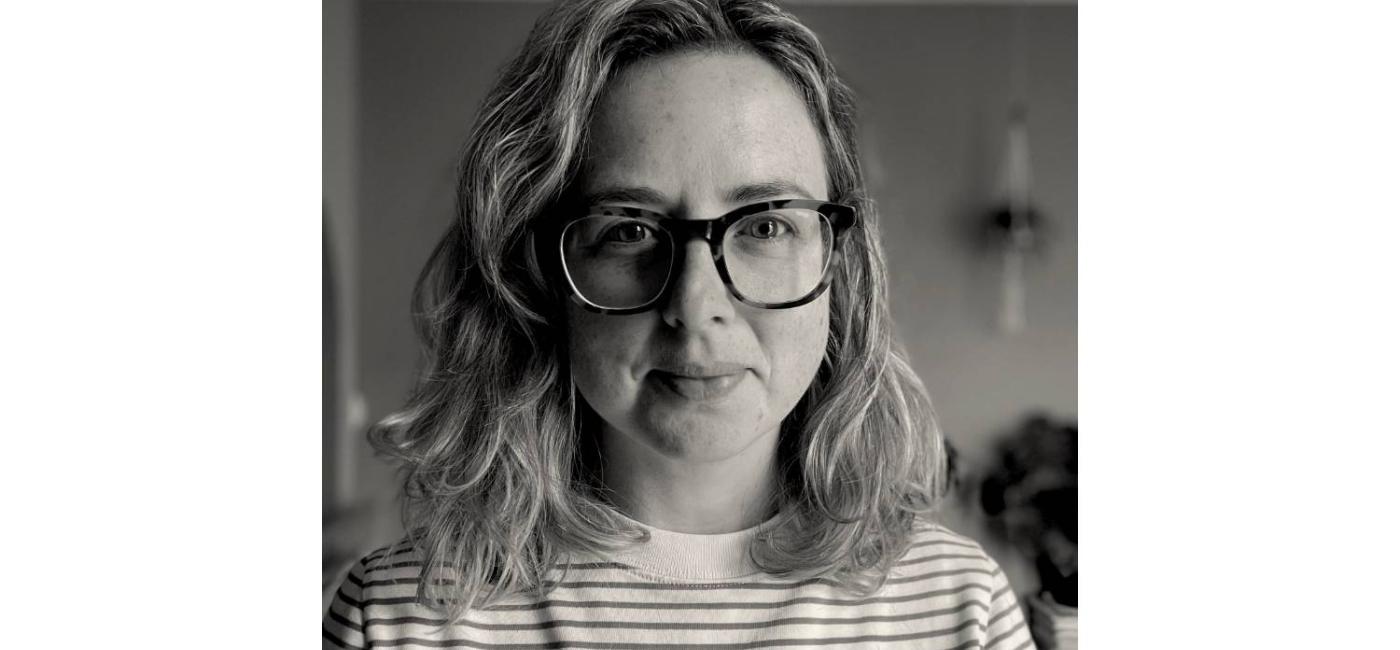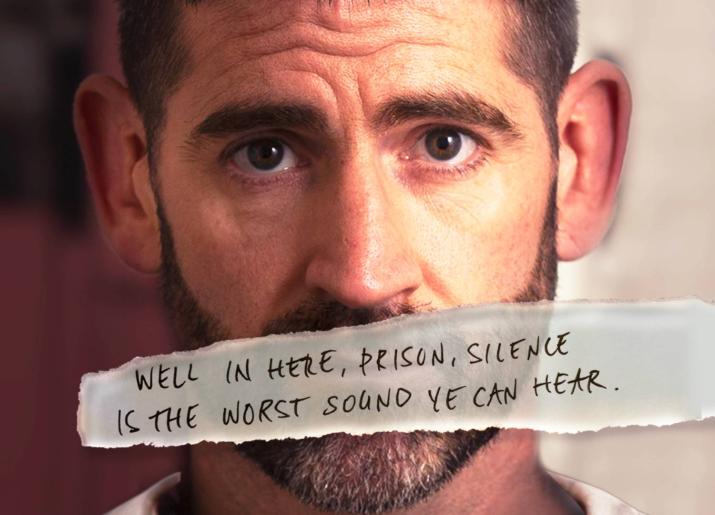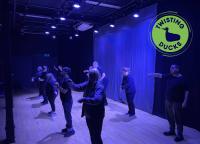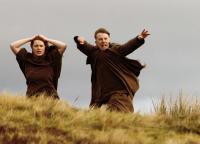Assistant Director Bex Bowsher interviews designer of One Off, Verity Quinn

As promised, this week I wanted to give our audiences a sneak peek into how One Off has been conjured physically for the Live stage by Verity Quinn. The design for One Off incorporates a radical reimagining of Live’s classic cabaret stage, seeing it replaced with three massive island-like platforms which we invite the audience to encircle.
One Off is set in the early 2000s in HMP Durham. The reality of life in a Category A prison, such as Durham, is that most of your time is spent alone in your own cell, with limited interactions with those incarcerated nearest you. Hot water pipes running across the back of each cell are a place where plaster and brick had been painstakingly chipped away by previous occupants thus creating small holes where private conversations could be held, music could be shared, and small amounts of contraband could be exchanged. The physicality of Quinn's design sheds the detail of each cell to highlight the isolation of the situation and thus the strength of the human spirit to connect even in the most difficult of circumstances.
Our central character in One Off, Prisoner DV7786 Shepherd, is in part saved by the relationship he builds with the nightwatchman ‘Jock’. It is Jock’s earnest compassion and unwavering belief that Shepherd can control his own destiny that guides Shepherd onto a new path. In the autobiographical detail that informs this play, Jock never saw the inmates nor did they him - the relationship was built through the slit between the door and wall. It was important that the audience experienced the full reality of Jock, whilst the design emphasized how the relationship could be built across a void.
Instinctively, it did not feel that having the audience separated from the action was the right choice. One Off is an exploration of communication and the building of relationships through unusual methods in unusual spaces, and we wanted the positions of the audience to reflect that. When you walk into the theatre for One Off, you will be invited to sit around the stage with the usual cabaret tables removed. Don’t worry though, as you won’t be asked to actively interact with the action on stage, just allow yourself to be fully immersed within the world that One Off builds.
Quinn had the challenge of stripping away the realities of the prison world to produce this design that emphasises and supports the idea of relationships at a distance – a challenge that is a standard part of her practice. Verity Quinn is an incredible and ingenious set and costume designer who has worked with wonderful companies such as Open Clasp¸ Zest Theatre and 20 Stories. Her work has been described as ‘magical’ and ‘ingenious’, two things that have fed into the design of One Off and, personally, makes me excited to share it with our audience.
I met with Quinn part-way through week two of rehearsals to find out more about how she conceived the design for One Off and what is so special about making theatre in the North East.
The following interview has been edited for length and clarity.
As someone who has made the North East my home, and loves making work here, I’m interested in knowing what it is that you love about making theatre here?
I was thinking about that this morning because I was in a meeting where with other creative team members and we were all in the same room. The advent of zoom is really, really useful. It's a brilliant tool. It allows me to work all over the country. That's fantastic, but there is something special when you get a group of North East theatre makers in the same room. It isn't a huge network here; everybody does seem to know each other or know of each other, and everyone’s got a little bit of history here there and everywhere as well. And there are two things that are interesting in that scenario. I remember when I was new on the scene and everyone got very excited because it was a new person, so I was treated very kindly and with a kind of excitement as well. And I thought that was an interesting experience. And then the flip side is? Everybody knows each other, and everybody gets to know the venues really well. I think it kind of deepens your practice because you get specific, you get detailed in your work, and you trust the other people that you're working with as well. And I think that's such a big thing as groups of people come together to make a thing. Do we trust each other? Do we know where each other’s strengths are?
What was it that appealed to you about One Off?
I read the script and I thought that the text was super rich. And I thought the voice of the piece was really clear. And I thought that it was genuinely moving and genuinely entertaining. And I think that's something that we talked about with One Off; ‘Is it a genuinely entertaining experience? Yeah. Is it provoking? Yes. It's moving and all those things’ because that's all part and parcel of being entertained. The voice is so strong in it, I think. So that was a starting point for me to go “I'm really excited about this” and I was excited as well about where Jack [the director] had started from, which was to go super elemental and strip it all back. And I think that plays to where I start from as well. We were starting with some similar questions, I suppose, about what we need, what do we not need, and what's the heart of the piece and how do we manifest that physically in this space? I think the other starting point was the space itself as well. What's special about this building [Live Theatre]? Of course, there are lots of special things, but what elements of that do we want to play to?
Tell me a bit more about kind of those first conversations that you had with Jack [McNamara] about the design.
There is an inherent challenge in this piece because you've got three people that, in the reality of the prison, would have seen each other face to face at other times, but in the scenes in which we find them, they're not talking to each other face to face, so that's quite difficult to stage because you could be asking the actors to pretend they can’t see each other, which we are in this scenario, but also, you're asking to inhabit the same space whilst doing that. So, I was trying to find a bit of a response to that. Then the other challenge is Jock, the prison guard, because the prisoners do not see him, but he's seen by us [the audience]. It's very much important that the audience can connect with him. And so, we talked about if he could be a voiceover. What are the different conventions that we could use? Is he somehow behind the audience? But it felt like he is such a pivotal character that it's really important that the audience can engage with him. What we've got is a kind of a space where he is, and we're answering why he is there. What's kept him in this quite difficult job for such a long time? We've got a space that is almost like a kind of a cell in and of itself, which he spends a lot of time in, but obviously, he is free to move around [and leave], which is the key difference.
Do you have any design rules? What do you have to ensure all your designs do?
I don't know that I have like hard and fast rules per se. Good question though. I think, like we were saying earlier, I'm always keen to strip it back and when I'm working on iterations of the design in the model box, I'm looking at OK, that's really exciting. That looks cool, but do I need all those bits and bobs? Can it be more concise? How come? Because how can we channel the meaning to the audience, better, and clearer? I think that's really important to me. And then I guess looking for “how does the space transform?” is something that I'd be looking to do.
How do you work? In my head, designers are kind of solitarily in their rooms, building little models. But is it more collaborative than that or does it depend on the show?
I think now I'm at a point where I know what rhythm I need to progress the design in a timely manner. There's always a deadline, so I think about that and work backwards. It’s those initial conversations with the director. And then I like to have a bit of time to go away and just kind of free-form and get inspired by different images. I chat with the production manager, think about the parameters of the space or the assets of the space and what we've got at our disposal and then come back together with the director and look over those images and chat through those parameters and think about how what kind of visual language we want to start to build. Then I go away and start working in 3D as soon as possible really. And then I think from there. I like to get to the white card and make the white card quite far along. I don't like it to be too sketchy because I want us to all be thinking clearly about what this design is going to need and whether we can actually do that or not, and whether it's offering the play what it needs as well. I suppose in answer to your question of is it a solitary experience? I think it can be, yeah. But I think it's timing those conversations, so they come at the right time.
Inviting interrogation at key points.
Yes because if it's at the wrong time, it's not a very enjoyable experience. And I need to know if I am ready to formulate this into something or if I am still looking for something else.
I'm going to steal a Simon Stevens question from the Royal Court Podcast, which is: what's the first show you ever saw?
Oh my gosh. I have a memory of, I think it was a panto and I was definitely under 10 and it was in Carlisle. I think at the Sands Centre, Leisure Centre in Carlisle where I grew up. It was very green. So, it's probably like Jack and the Beanstalk or something. And I remember there was an audience interaction bit and my mum being like, “go on, get up, put your hands up, put your hands up”. And I got chosen. At the time I was really into it. Now I'd hate to be chosen but at the time, it was a memorable, memorable experience.
What do you think took you from that experience of theatre to deciding that that's what you want to do?
I think for me the theatre design idea came towards the end of school because I was always really into art. I was always quite big into painting and a little bit of 3D, but not loads actually. I was also really into drama and so I used to spend a lot of time in the theatre and knew about theatre. All my after-school hours were either in the art studio or in drama. And then I saw an exhibition by the Society of British Theatre Designers. Every four years they do like an exhibition of British theatre design and so it's basically like a huge room or exhibition space filled with model boxes, so that I was like, ‘oh, so you can marry the two, so you can do both.”
We're probably more than halfway through your journey with One Off now, but what's been your favourite part of the process so far?
I always really like seeing actors starting to inhabit the space and inhabit the characters and hearing those lines come to life and starting to see how the design and all the elements of the production are going to kind of fuse together with that. So, seeing what the chemistry of those performances is, I suppose it's always exciting. And I think I always get excited when we get into tech as it's grueling, obviously for everyone, but it's also the most exciting part as well.
Quinn’s design embraces the epic reality of Live Theatre’s stage space and is an artistic endeavour worth seeing on its own merit. However, this design combined with the richness of language in the written play makes it truly an unmissable piece of theatre. One Off does not try to come up with a reason for all the prisoners to be inhabiting a space together, instead, it embraces the separation, and isolation of the inmates. Quinn's reconfiguration of the space within Live Theatre invites the audience to live within the enclosure and claustrophobia of prison life. The raised platforms envelop and isolate each prisoner and supply a demarcation from the reality of events around the prison.
Bex Bowsher
One Off Assistant Director
RTYDS Resident Assistant Director
Companies like Live Theatre and Paines Plough who partnered to produce One Off are dedicated to producing innovative writing and play a vital role in developing new work, but they can’t continue to share these incredible stories without ongoing support, so please think about making a donation of any size using the link here.
One Off plays at Live Theatre from Thu 10 - Sat 26 Nov 2022. Find out more & book tickets here.





